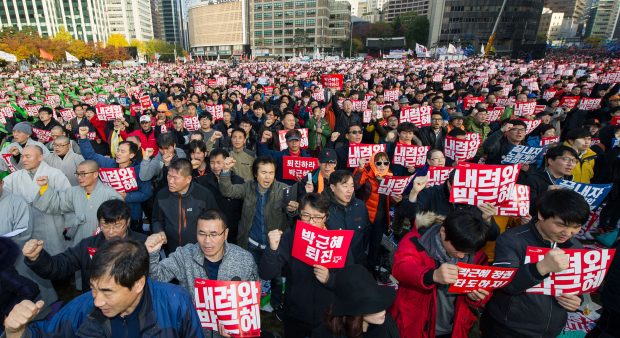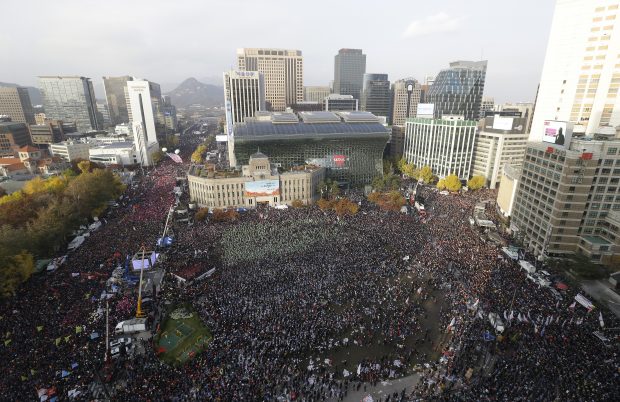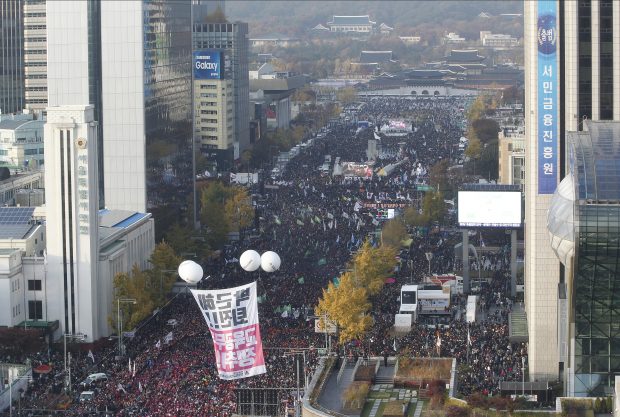ONE MILLION protesters show people power

SEOUL, Nov. 13, 2016 (Xinhua) — People attend a rally in downtown Seoul, capital of South Korea, Nov. 12, 2016. South Koreans staged peaceful rallies across central Seoul on Saturday night to demand President Park Geun-hye step down over a scandal involving her longtime confidante and former aides. (Xinhua) (zhs)
Choi Ha-young, Kim Bo-eun– The Korea Times
A never-ending stream of one million people marched into Gwanghwamun Square, central Seoul, Saturday, to join the nation’s biggest candlelit protest in decades, calling for President Park Geun-hye to step down.
People from all walks of life chanted: “Park should step down.” The President is under mounting pressure because of the influence-peddling scandal involving her confidant Choi Soon-sil.
The organizers estimated about one million people took to the streets — the largest protest movement in the nation in 30 years and bigger than the June Democracy Movement demonstrations in 1987, which forced the then military-controlled government to yield to a free presidential election. Police estimated 260,000 citizens turned out.
By 2 p.m. Seoul Plaza was already packed with people. Later, they marched through central Seoul, holding candles and chanting anti-Park slogans and kept the protest going on late into the night. Some marched toward Cheong Wa Dae, the presidential office, and clashed with police, but the protest ended peacefully, with only minor injuries reported.

Protesters stage a rally calling for South Korean President Park Geun-hye to step down in Seoul, South Korea, Saturday, Nov. 12, 2016. Tens, and possibly hundreds, of thousands of South Koreans were expected to rally in Seoul on Saturday demanding the ouster of Park in what would be one of the biggest protests in the country since its democratization about 30 years ago. (AP Photo/Ahn Young-joon)
Like the two previous peaceful protests, people came with their families, in couples and with groups of their friends. They said they wanted to show their anger toward President Park for ruining democracy by allowing her friend to meddle in state affairs.
“It’s really shameful that a President’s friend has interfered in key state affairs so broadly and for so long. Not only Park, but her secretaries and pro-Park lawmakers should all take responsibility for the scandal and they must be honest about their wrongdoing,” said Lee Gap-hyo, 53, an office worker, who came out with his wife. “Park is no longer our president. We the people have the right to force her out. That’s why I’m here.”
Many young couples turned up with their children to show and teach them what democracy is.
“I brought my children out here to show them what is right,” said Lee Dong-woo, 42, an office worker in Seoul, who took part in the march with his wife and two children, aged seven and five. “I explained the situation to my children and they said they would make a poster demanding that the President apologize for her wrongdoing.”
Yoo Yong-sik, 46, an office worker, came with his daughter. “I skipped a private tutoring class to be here, as I think the fate of our nation is way more important than my studies right now,” said his daughter Yoo Hyo-jin, 16, carrying a poster that she had made.
High school students who will take the college scholastic ability test (CSAT) next week were no exception.
“Although the CSAT is just a week away, we came here to demand that the President step down,” said Yun Hui-yeong, 18, from Gunpo, Gyeonggi Province.
It was not simply the influence-peddling scandal that attracted many of the people. Union members from the provinces came to Seoul by bus to protest against the government’s labor policies.
“We feel very unsettled by the performance-based salary system, as there are no objective standards to calculate a worker’s performance,” said one member surnamed Kim, 29, from the Korea Gas Corporation’s Daegu branch. The unions arrived here this afternoon and will stay until the end of the march.
For students majoring history, the government-authored textbooks are a lingering problem. “This poster is the same one I used last year when Park declared the policy,” said Choe Hong-byung, 28, who is enrolled in a master’s course in Korean history at a university. “Many state decisions were made under the influence of Choi Soon-sil, maybe the textbook policy is one of them.”
For parents, the unfair college entrance of Choi’s daughter Chung Yoo-ra was another reason to join the march.
“I hope our society becomes equal for everyone,” said Lee Hyo-jeong, 33, from Suwon, Gyeonggi province. Holding her three-year-old, she said her life has got worse under the Park administration. “I feel that our society is becoming more polarized while welfare policies falter.”
Foreigners studying in Korea joined the march as it moved toward Cheong Wa Dae. “I read some articles in the local press and came to see what is going on here,” said Jasmijn Broerze, 22, an exchange student from the Netherlands studying at Seoul National University (SNU). “We have protests in the Netherlands but nothing as massive as this.” Broerze attended with fellow exchange students from Germany and Spain.

Protesters stage a rally calling for South Korean President Park Geun-hye to step down in Seoul, South Korea, Saturday, Nov. 12, 2016. Tens, and possibly hundreds, of thousands of South Koreans were expected to rally in Seoul on Saturday demanding the ouster of Park in what would be one of the biggest protests in the country since its democratization about 30 years ago. (AP Photo/Ahn Young-joon)
Farmers walked from City Hall to Gwanghwamun bearing a bier on their shoulders. Instead of chanting, they sang a traditional song for a Korean funeral. “This means Park’s political death,” said Choi Yong-cheol, 65, from Daejeon.
“The price of rice is 20 percent of the price for dog food. The late farmer Baek Nam-ki died while calling for Park to keep her promises she made to help agriculture. His death feels like my business.” According to Statistics Korea, the nation’s rice price dropped to a 21-year low this year.
Next to the bier, musicians and popular comedians were performing on stage. People greeted legendary rock band Crying Nut with acclamation.
“It feels like a festival,” said Jeon In-eui, 27, who participated in the protest with his friend Ji Moon-soo, 27. When the band sang their masterpiece “Run the Horse” people in the crowd danced around as if they were enjoying a concert. “I came here last week, and I’m happy to do my share to raise awareness about the protest by peaceful means,” Ji said.
After the organizers declared the end of the event at 10:25 p.m., a group of participants stayed and enjoyed street concerts that continued on into the night. Students played “samulnori,” a Korean traditional percussion quartet. Citizens also shared food, and cleaned up the streets together.
Meanwhile, a confrontation between the police and protesters took place near Gyeongbok Palace Sung station where police had installed a barricade to block the march from heading toward Cheong Wa Dae. People resisted, singing the national anthem, and shouted “peaceful protest” and “let the police join the march.” Family members of the Sewol ferry disaster victims also joined the march, calling for the police to open up the way.
Around 11:10 p.m. some protesters tried to break through the barricade. The police took 23 people, charging them with assaulting police officers and occupying roads, to six police stations in the area. According to police, 30 people including four police officers were taken to hospitals for treatment of minor injuries.
While an estimated 100,000 from the provinces arrived in the nation’s capital, thousands of people poured into the streets in cities and towns across the nation: 35,000 in Busan, 10,000 in Gwangju, 4,000 in Daegu and 5,000 on Jeju Island, the organizers said.
The organizers said they will continue to hold candlelit marches every Saturday until President Park steps down.



















































